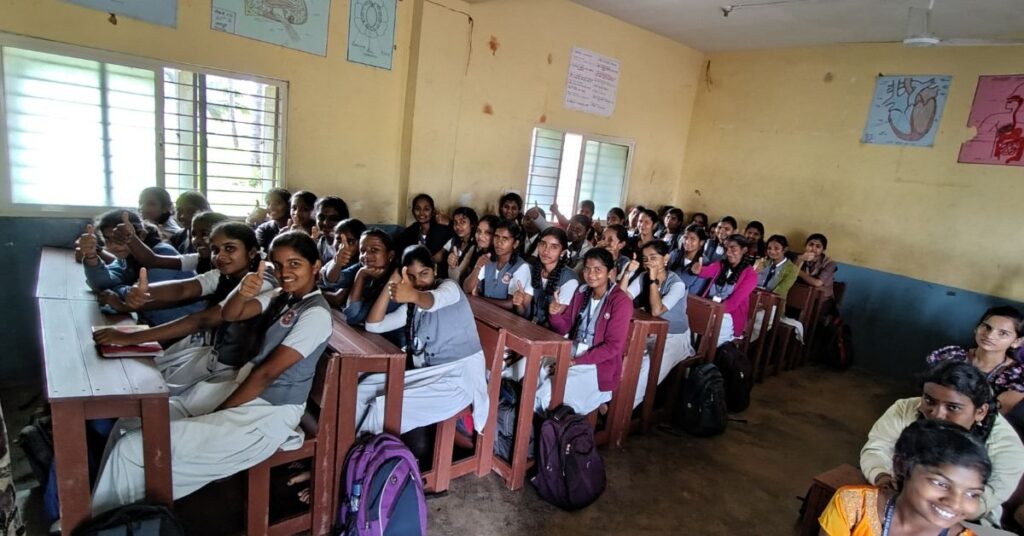In a world drowning in plastic and cutting down forests for furniture, a Bengaluru-based startup, unWOOD, is flipping the script. In just four months, this innovative venture has transformed 10 tonnes of hard-to-recycle plastic waste — the kind that typically ends up in landfills — into durable, wood-like outdoor furniture. But more than that, it’s giving underserved children across India a place to sit and learn with dignity.
A Problem Hidden in Plain Sight
- Each year, India uses over 8 to 13 million cubic meters of wood for furniture — a number expected to rise significantly by 2030.
- Meanwhile, thousands of students in rural schools still sit on cold cement floors, affecting posture, concentration, and learning outcomes.
- Add to that the mountain of plastic waste — chip packets, wrappers, PPE kits — piling up daily in landfills.
What if these two problems could solve each other?
Enter unWOOD: Where Trash Becomes Treasure
Founded by Vishal Mehta and Dr. Babu Padmanabhan, unWOOD was born out of a desire to address two crises at once — deforestation and plastic pollution.
- Vishal, a mechanical engineer with 17+ years in renewable energy, witnessed firsthand how even “green” industries generated unsolvable plastic waste.
- Dr. Babu, a materials scientist with experience working with the International Space Station, had been developing a technology that could transform plastic into wood-like boards.
Together, they built unWOOD, a startup with a bold vision:
🟢 “Make the furniture everyone needs from the plastic no one wants.”
The Science Behind the Innovation
At the heart of unWOOD’s breakthrough is the Macro Molecular Fibre Matrix (MMFM) technology, a game-changing approach that:
- Works with dirty, mixed plastic — no sorting or cleaning required.
- Uses no water, low energy, and no harmful chemicals.
- Mixes plastic with natural fibres to produce tough, weather-resistant boards that look and feel like wood.
💡 One kilo of unWOOD saves 1.5 kg of CO₂ and uses 500g of waste plastic.
When the Market Said No, They Said “Let’s Do It Ourselves”
Initially, unWOOD offered only raw boards, but faced market resistance — no one wanted to try something “too new.” So, they pivoted:
- Created their own brand of outdoor furniture, starting with benches, tables, fencing, and railings.
- Targeted public spaces and schools where durability and weather-resistance are crucial.
‘Benches for Change’: Giving Students a Better Seat
Through their CSR-backed campaign, Benches for Change, unWOOD has already:
- Supplied 230+ benches across 4 rural schools in Karnataka.
- Benefited 440+ students, replacing floor-seating with comfort and dignity.
- Engaged with corporates, NGOs, and philanthropists to scale impact.
“We wanted kids to not just sit comfortably, but also learn about sustainability through these benches.” — Vishal Mehta
Powerful Stats from unWOOD’s Early Impact
- ✅ 44,000 chip packets recycled to make park benches
- ✅ 10+ tonnes of waste plastic recycled in 4 months
- ✅ 31 trees saved through wood-alternative material
- ✅ Up to 10,000 units/year manufacturing capacity
- ✅ Recognised by Climate-KIC and presented to the Andhra Pradesh CM
One Park Bench =
🔹 14,000 plastic bottles
🔹 44,000 snack wrappers
🔹 1,500 broken plastic toys
🔹 1 fully grown tree saved
Looking Ahead
Operating out of Peenya Industrial Estate, unWOOD’s 16-member team (8 full-time, 8 contract) is gearing up to:
- Expand production and outreach
- Collaborate with sustainable architects and city planners
- Become a core part of India’s circular economy infrastructure
Changing How We Think About Waste
More than just recycling, unWOOD is redefining value. From waste that’s considered worthless, they’re creating something functional, beautiful, and inspiring.
“If we can make the world sit on trash — comfortably, sustainably, and proudly — then we’ve done our job.” – Vishal Mehta
🔗 Explore more about unWOOD and their impact-driven furniture at unwood.in

